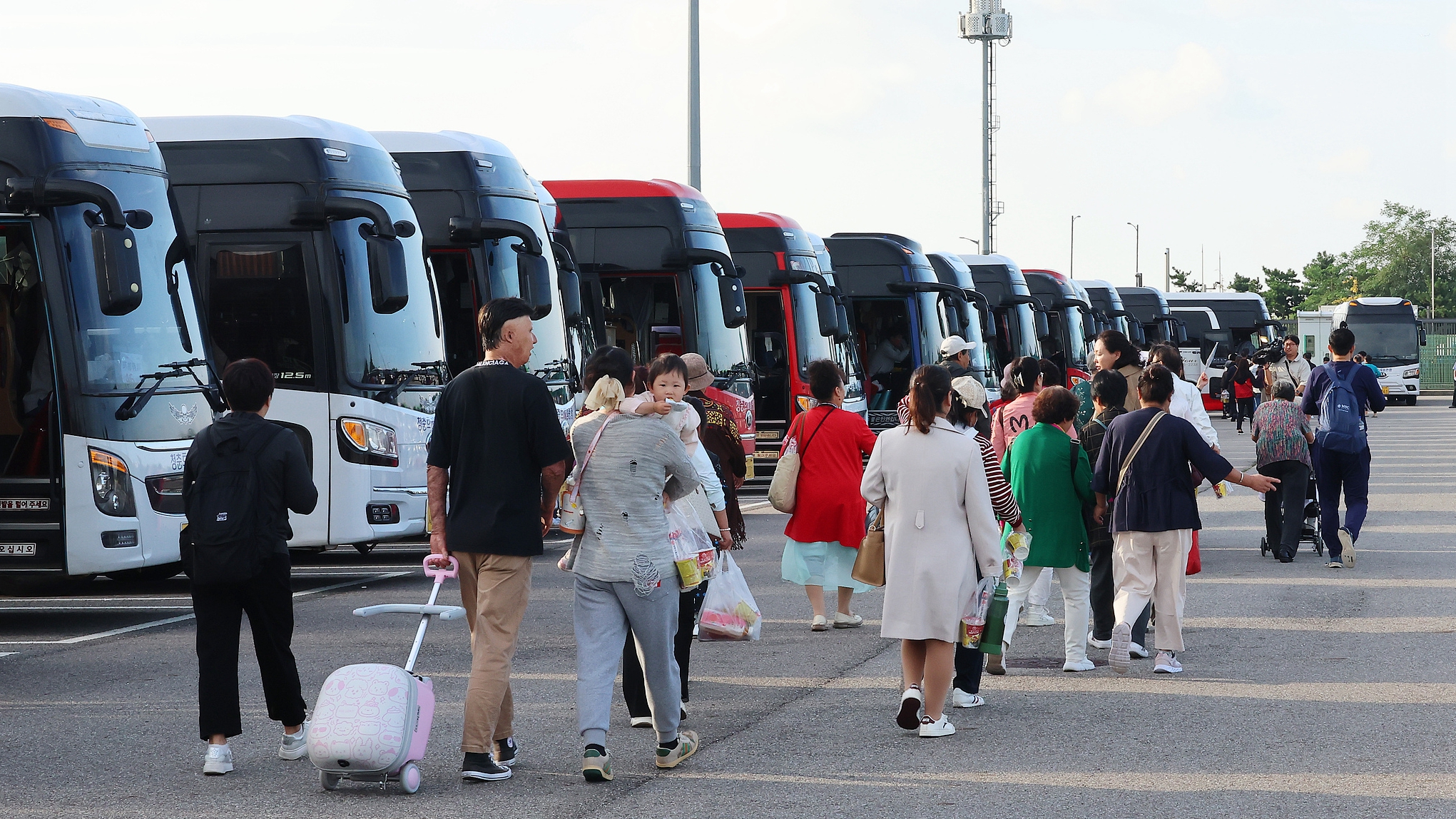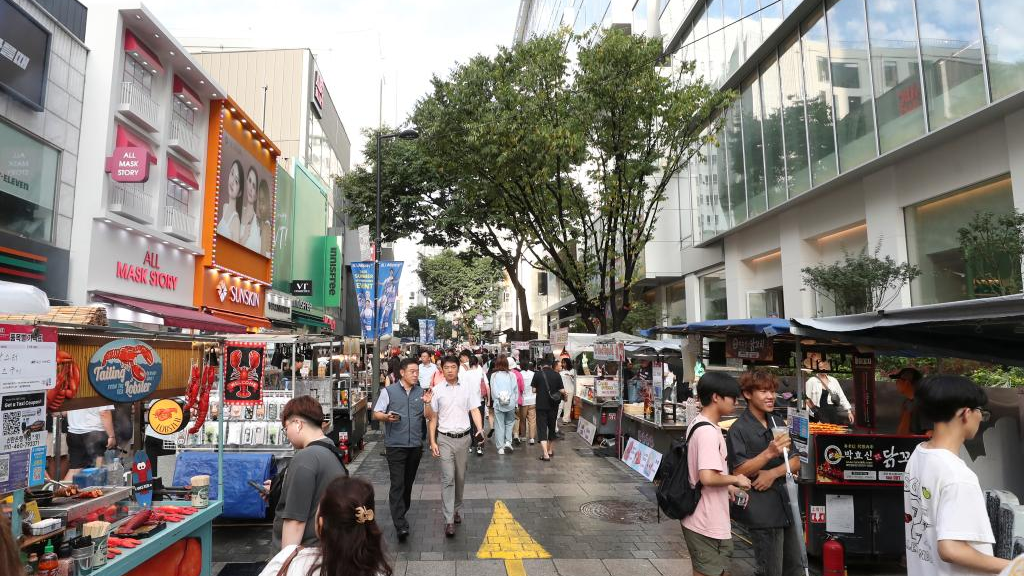
Tourists at Incheon Port International Cruise Terminal in South Korea, September 29, 2025. /CFP
Editor's note: Xiang Haoyu, a special commentator for CGTN, is a specially appointed research fellow at the Department for Asia-Pacific Studies, China Institute of International Studies. The article reflects the author's opinions and not necessarily the views of CGTN.
Starting from Monday, the Republic of Korea (ROK) will implement a temporary visa-free policy for Chinese tour groups lasting nine months. This move is a positive response to China's unilateral visa exemption for South Korean visitors introduced last November. It is expected not only to deliver a strong boost to Seoul's economy, but also to serve as encouraging news for the development of China-ROK relations.
South Korea's decision to introduce the temporary visa-free policy carries a clear purpose: to stimulate its domestic economy. Since last year, the country's growth momentum has weakened under the combined pressure of the global downturn and persistent structural challenges at home.
Tourism, regarded as a vital driver of domestic demand and job creation, is expected to play a pivotal role in recovery. Within this sector, Chinese visitors undoubtedly represent the most significant share of South Korea's inbound tourism market.
Statistics show that before the COVID-19 pandemic, China was South Korea's largest source of inbound tourists. According to the Korea Tourism Organization, the number of Chinese visitors reached over eight million in 2016, accounting for around 47.5 percent of all foreign arrivals. Although the figure declined following the deployment of the Terminal High Altitude Area Defense (THAAD), an American anti-ballistic missile defense system designed to intercept and destroy short-, medium- and intermediate-range ballistic missiles in their terminal phase, it still stood at six million in 2019. After the pandemic, the numbers began to rebound, reaching 2.02 million in 2023 and climbing to 4.6 million in 2024, representing 28.1 percent of total overseas visitors.
Despite this strong recovery, the gap with pre-pandemic levels remains considerable. Given the sheer scale and spending power of Chinese tourists, who play a crucial role in South Korea's retail, hotel and catering sectors, the timing of the visa exemption – announced just ahead of the National Day holiday and Mid-Autumn Festival – clearly reflects Seoul's intention to attract more Chinese travelers. Industry estimates suggest that a surge in group tours from China will generate substantial economic benefits and help ease the pressure caused by sluggish domestic demand.
Following the announcement of the policy in August, searches for flights to South Korea on Chinese online travel platforms surged immediately. Data from Qunar.com, a Chinese travel platform, showed that compared to the previous hour, searches for tickets to Seoul jumped by nearly 70 percent.
For years, Chinese tourists have been the main driving force behind duty-free consumption in South Korea. According to analysis by the Bank of Korea, the average spending of Chinese visitors in 2019 reached $1,689 per person, far exceeding that of American and Japanese travelers.
As a result, the visa-free policy is widely regarded by South Korean businesses as a tangible boost for the recovery of duty-free sales. Moreover, the country's airlines, hotels and retail sectors have all expressed strong expectations and have already begun preparations to welcome the influx of Chinese tourists.
On a deeper level, this move also reflects a pragmatic choice by the ROK government within its broader strategy of economic diversification and risk mitigation. Against the backdrop of global supply chain restructuring and rising trade protectionism, the risks of overreliance on specific industries and export markets have become increasingly apparent. Strengthening the domestic consumption market has thus emerged as an urgent priority, making the Chinese tourist market – with its immense potential – a natural and strategic focus.

Tourists visit Myeongdong shopping area in Seoul, South Korea, August 6, 2025. /Xinhua
For China-ROK relations, the most direct impact of visa facilitation lies in its potential to "break the ice" in cultural and people-to-people exchanges. In recent years, public goodwill between the two nations has remained at a low ebb, affected by the THAAD issue and rising geopolitical tensions.
Mutual perceptions have been largely shaped by online discourse dominated by nationalist sentiments, resulting in biased and stereotyped impressions. Firsthand experiences gained through tourism offer the most effective way to break through these informational bubbles and dissolve entrenched misunderstandings.
For Chinese tourists, setting foot in South Korea offers a direct and immersive way to experience the country's social landscape and everyday life. They may come to realize that beyond K-dramas and K-pop, South Korea also offers valuable examples in technological innovation, urban governance and social services. Such insights, grounded in personal experience, are far more authentic and profound than any secondhand report, helping to construct a more nuanced and comprehensive image of the nation.
Similarly, since China introduced visa-free entry for South Koreans last year, an increasing number of ordinary Korean tourists, businesspeople and scholars have visited China, to the extent that phrases like "Young Koreans are increasingly making Shanghai their top choice for weekend trips" have become trending topics on Chinese social media.
Many Korean visitors have witnessed China's rapid transformation firsthand, experienced the convenience of mobile payments and the vitality of the digital economy and been captivated by the country's diverse and magnificent landscapes. These direct experiences have largely reshaped outdated perceptions of China.
The recent reciprocal adjustments in visa policies between China and South Korea represent a prudent move grounded in both practical interests and long-term development goals. This is not merely an economic policy shift, but a strategic decision aimed at deepening people-to-people exchanges and fostering mutual understanding. Once the barriers to personal mobility are removed, economic integration can be further strengthened and the emotional distance between the peoples of the two nations can gradually be bridged.
Of course, it is important to recognize that facilitating visas is only the first step. How to enhance the quality of tourism services, address potential cultural frictions and transform the benefits of increased exchanges into deeper trust and cooperation remain pressing challenges for both countries.
As the Chinese saying goes, "evil cannot prevail over justice." With the doors of exchange between Beijing and Seoul opening ever wider, it is believed that certain isolated anti-China currents will eventually be swept aside by the tide of history. Granting visa-free access to Chinese group tourists represents a significant step by South Korea's new government toward improving bilateral ties, and it is hoped that this step can be taken even further.
(If you want to contribute and have specific expertise, please contact us at opinions@cgtn.com. Follow @thouse_opinions on X, formerly Twitter, to discover the latest commentaries in the CGTN Opinion Section.)